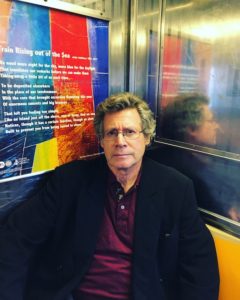Bruce Robinson, whose poem “Medication on a Forbidding Morning” appears in SRPR Issue 46.1, engages a poetics of emplacement to question the borders between built environments and the natural world.
A recent trip cross country (almost, not quite) made me aware that, while flying, I was never quite sure where here was, until I got there. I was happy enough with my place, inside a metal tube, but really I was neither here nor in a past, or future, there. I was not quite at point Nemo, that “spot” in the Pacific considered the pelagic point of inaccessibility, but effectively (and more or less securely) displaced from land.
Our place is uncertain, always transitory although we may not realize it. We are place-shifters more than shape-shifters, at once content with what surrounds us and curious about what doesn’t. And why do we take refuge in the comfortable recognition of place, when even, with or without our notice, this place, this world, yes, everything, is constantly changing? Except for the song of the cardinal, confident enough in its song not to change it, at least not for our ears.
I want to say that I’m not too interested in place; place appears to be interested in me, imposes itself upon me, I’m in place, I can’t escape it, even when my velocity assures me that I have. We’re here, after all, aren’t we? So the question we may want to ask is: how will we begin to recognize that which we tend to ignore, which we have to ignore if we must make our way to, say, the grocery store? How will we begin to use our eyes, ears, etc., to reach our newfound land? I’ve been reminding myself for years (unsuccessfully) to read Simon Schama’s Landscape and Memory (1995) and I feel as though now I’m paying the price for having left that book on the shelf.
The nineteenth-century ukiyo-e, or more specifically meisho-e—woodblock prints of the moons and mountains that so obsessed certain Japanese artists—capture this push and pull between here and there, perceived place and implied place, and between the transitory and the relatively permanent. Even the magnetic north’s a moving target.
If I think or write about a tramway, a streetcar, well: It’s in Marseille. It’s on tracks. People are blocking it. Or is it? Perhaps it’s only a construct in a poem I’m writing, a memory from a film I’ve seen and love. Perhaps this instability is more inescapable in fiction or in film, and perhaps part of the challenge of the poem is to work against the insistence of place, to use place as the flight deck of the page, an echo of Melville’s demand for “Vesuvius’s crater for an ink stand.”
Before I forget: my poem in SRPR, “Medication…,” was devised well before I first listened to Junior Gong’s song of the same name. You could say that my poem is about a built environment, except that it’s open to the natural world. Where’s the division, the separation? Where’s a recognizable border? I don’t want to impose too political a stance on this, but perhaps the lens through which we perceive any current place on a planet in difficulty—this planet, for instance—is a display of our own complicity in the evanescence of place.

Recent work by Bruce Robinson appears or is forthcoming in Pangyrus, Maintenant, Seventh Quarry, Rattle, Main Street Rag, Evening Street Review, and Toho Journal. This is his second appearance in SRPR.
You can order a physical copy of 46.1 on our website, or purchase a 2-year subscription.
And if you want to keep up with us on social media, you can follow us across
Instagram: @srpr_news
Twitter: @srpr_news
Facebook: SRPR (Spoon River Poetry Review)
